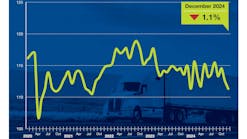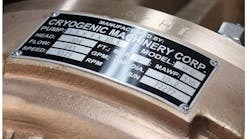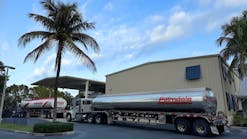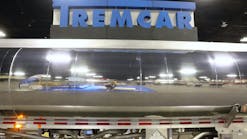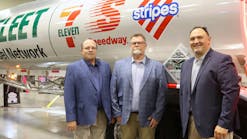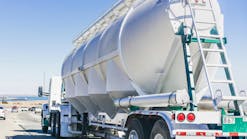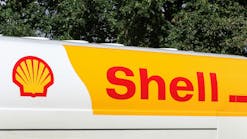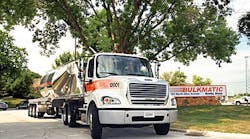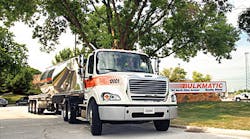Bulkmatic Transport manages, maintains fleet to give customers best possible service
WITH NEW equipment costs soaring in recent years, truck fleets are scrambling to maximize their investments in tractors and trailers. They are aggressively pursuing strategies to contain fleet costs.
Managers at Bulkmatic Transport Company in Griffith, Indiana, are tackling the issue in a broad manner. This includes close oversight of vehicle specifications, a comprehensive in-house preventive maintenance program to maximize fleet uptime and performance, and cooperation with shippers to make sure they understand the impact of higher equipment costs. The strategy is paying dividends.
“Our primary objective is to make sure we have the right equipment needed to adequately serve our customers,” says E Larry Smith, Bulkmatic senior vice-president of sales. “We also need to make sure that our tractors and trailers are in the safest possible operating condition at all times. That can be tough in today's economy, but it is critical.
“New equipment prices are rising dramatically, as are maintenance costs. The price of a new tractor today is in the range of $110,000. Dry bulk trailer prices have climbed from $50,000 to the $80,000-plus range. Self-loaders can cost as much as $100,000.
“We're keeping equipment longer due to the higher prices, which means tractors and trailers must be spec'd very carefully. If we go too robust, we can lose productivity due to unnecessary tare weight. If our specs are too light, we don't get the life needed to recover the investment. Just as importantly, we must spec equipment for maintainability.”
Dry bulk specialist
Mastering challenges of that sort have helped make Bulkmatic Transport one of the largest dry bulk carriers in North America and one of the largest US tank truck carriers overall. The carrier posted revenues of $96 million in 2010.
Bulkmatic Transport provides a full range of dry bulk services, including transportation, warehousing, and intermodal operations. A fleet of 453 tractors and 1,200 trailers (dry bulkers and tanks) operates out of about 40 terminals in the United States.
On the intermodal side, Bulkmatic Transport provides a range of transloading services from about 50 locations in the United States. The carrier operates 20 of those transload sites. In addition, the carrier has 10 truck-rail transfer facilities in Mexico, making it the largest dry bulk transload provider in that country.
“Seventy-percent of our business is food or plastics,” Smith says. “We haul a lot of flour, sugar, starch, and a wide variety of plastics. On the industrial dry bulk side, we handle substantial quantities of soda ash, sand, limestone, and lead oxide.”
Good times
Times are quite good right now, and there are plenty of dry bulk loads of all types to keep the carrier's tractors and trailers busy, according to Albert Y “Butch” Bingham, Bulkmatic president. “These are terrific times right now,” he says. “Here in Indiana, the economy is relatively strong, and state policies are encouraging business.
“Capacity has left the industry, and many carriers downsized or fell behind on equipment replacement during the recession. This has had a positive impact on rates for us.”
Bingham believes even more capacity will leave the industry in coming years due to the Federal Motor Carrier Safety Administration's Compliance, Safety, Accountability (CSA) program. “CSA is a big positive for the trucking industry, because it levels the playing field,” he says. “It should clear away a lot of bad fleets and bad drivers. Shippers need to understand that they will be affected, because they can be found liable for failing to monitor a carrier's safety standing. This is the biggest regulatory fork in the road since 1980.”
Like many carriers, Bulkmatic Transport went through some downsizing that forced some painful changes. “We had to fight for our life,” Bingham says. “Recovery took time, but we are a better company today. We had to focus on improving and strengthening operations in-house, and we learned what really was important.
“We realized we had to provide the best possible value for our customers, and we had to make sure that Bulkmatic Transport was the best place to work. It's important to note that our employees stuck with us throughout the entire process. Today, we are back on the growth track and so many exciting things are happening.”
Bulkmatic Transport placed some of its biggest vehicle orders in recent years during 2011, and the carrier plans to buy more in 2012.
Dry bulk trailer purchases in 2011 consisted of 15 high-cube units from Beall Corp and 10 bulkers from MAC Trailer Manufacturing with 720-cu-ft capacities. The new Beall trailers will be placed in flour service, while the MAC bulkers went into specialized service hauling lead oxide.
MAC's PneuMACTic-model dry bulker is constructed with an integrated ladder at the rear for top access. Hardware includes Sure Seal hopper tees, butterfly valves, aerators, and air filters, Dixon Bayco check valves, and Knappco domelids. John Evers, Bulkmatic Transport corporate maintenance director, says Bulkmatic Transport also will spec hardware from Bulk Tank Inc with future dry bulk trailer orders.
A tri-axle Hendrickson suspension gives the MAC bulkers a distinctive look. “The tri-axle arrangement was the only way to legally scale an 80,000-lb gross combination weight with these short bulkers,” Evers says. “Tare weight for these trailers is a very good 9,800 pounds.”
The four-hopper high-cube Beall trailers have a 1,620-cu-ft capacity, which is typical for most of the dry bulk trailers in the Bulkmatic Transport fleet. Heil Super Flo trailers account for a majority of the fleet's high-cube bulkers.
More than 200 of the 1,400 trailers in the Bulkmatic Transport fleet have been fitted with Standfast's TRAM fall protection system, which consists of a base, rail, handhold, mounting hardware, and body support. “It's a good product,” Evers says. “We use the system on trailers in specific applications, because it does add considerable weight.”
Most of the trailers in the fleet have Hendrickson Intraax air-suspension systems. All new trailers are ordered with tire inflation systems, and the carrier uses both Meritor Tire Inflation Systems by PSI and Hendrickson's Tiremaax system.
Both trailers and tractors are being specified with roll stability systems and Michelin widebase tires. “We specify the Haldex roll stability system on our trailers, and we choose the Bendix or Meritor systems for tractors depending on make,” Evers says. “Roll stability systems are a good deal for the price and should be standard on all commercial trucks and trailers. We want widebase tires for the weight savings.”
Tractor variety
On the truck side, the carrier bought 44 new tractors in 2011 and 25 in 2010. “We have to weigh the cost of maintaining our existing fleet versus the price of new trucks,” Smith says. “We're keeping equipment longer — seven years, compared with five years. Even with tighter capacity in the industry, current rates don't fully cover a normal depreciation schedule. On an hourly basis, a plumber generates more revenue than we do.”
Tweaking specs
Bulkmatic Transport's tractor specifications are constantly being tweaked to maximize return on investment. The carrier currently purchases Freightliner, Mack, and Peterbilt trucks.
Proprietary engines are specified with each make of tractor, and horsepower ratings are 395 (Mack) and 435 (Freightliner and Peterbilt). Eaton Fuller 10-speed manual transmissions are standard. The carrier uses tandem drive axles, as well as some single drive axles with tag or pusher axles.
“We can cut a couple of hundred pounds with a tag or pusher axle,” Evers says. “We're also specifying a Holland aluminum fifthwheel, which saves about 100 pounds and helps offset some of the higher engine weight. We're saving another 70 pounds by taking the passenger seat out of some trucks.”
For product handling, tractors are specified with Gardner Denver blowers and Sure Seal air cleaners and mufflers. Power Transmission Options, a Spanish manufacturer, supplies a PTO that is lighter and more compact.
All of the tractors in the fleet have Qualcomm on-board communication and tracking systems with electronic driver log capabilities. The carrier completed the fleet-wide conversion by the end of last year.
Maintenance network
Bulkmatic Transport uses its in-house network of maintenance shops to help ensure that the tractors and trailers are kept in the best possible condition. Roughly half of the carrier's 40 terminals have maintenance shops, which provide routine preventive maintenance and light to medium repairs.
“Our shops are relatively small in most locations, but they are important because they ensure that we see our vehicles on a regular basis,” Evers says. “Our mechanics handle tire service, oil changes, brake jobs, and some dry bulk trailer repairs. We send most of the big jobs to dealers or commercial shops.”
Tractor preventive maintenance (PM) is based on engine hours. Dry PM service (inspection and chassis lube) is done every 250 hours with a wet PM (engine oil change) at 1,000 hours. Trailer PM service is on a 60-day cycle.
Bulkmatic Transport's maintenance made a big change in 2011 when it shifted tractors to Shell and CITGO 5W40 synthetic engine oil. “We believe that the synthetic engine oil products from these two companies will give us the best bang for our buck in terms of fuel economy,” Evers says. “We've been using synthetic gear lubes for 20 years, and the synthetic engine oil costs have become more reasonable as diesel prices have climbed.”
He adds that Bulkmatic Transport should be able to double the drain interval with the synthetic oil. In addition, the 5W40 oil is better in winter for engine startability. It's better for batteries, and lowers engine heating demands in cold weather.
Wash racks
Also part of the terminal network are 15 wash racks. “Most of what we do is foodgrade cleaning,” says Brian Daugherty, Bulkmatic Transport senior vice-president of quality. “Many of the products we haul have a connection to food and edibles. Cleaning is a critical factor in providing our shippers with high-quality bulk transportation service.”
Cleaning is such an important part of the operation, that wash rack upgrades accounted for 50% of the carrier's capital investment in 2009, at a time when money was very tight. “We improved wash rack ventilation, and we made the cleaning systems easier to operate,” Daugherty says.
The typical Bulkmatic Transport wash system is a high-pressure unit that delivers hot water at 170°F to 190°F. the company wash racks have one to two cleaning bays.
Efforts also have been made to upgrade worker skills and capabilities. “We made a lot of changes on the worker side,” Daugherty says. “We realize that we need workers who are more knowledgeable and are problem solvers. We're looking for workers who are detail and mechanically oriented.”
No longer is the wash rack position considered little more than a stepping stone to driver. “We've changed the pay scale, and we make it clear to the wash workers that they are an important part of our team,” he says. “We give them ownership of the job. We want to make the wash rack a career choice.”
It's all part of the overall Bulkmatic Transport strategy that is designed to give customers the best possible service. It's a strategy that is working. ♦


